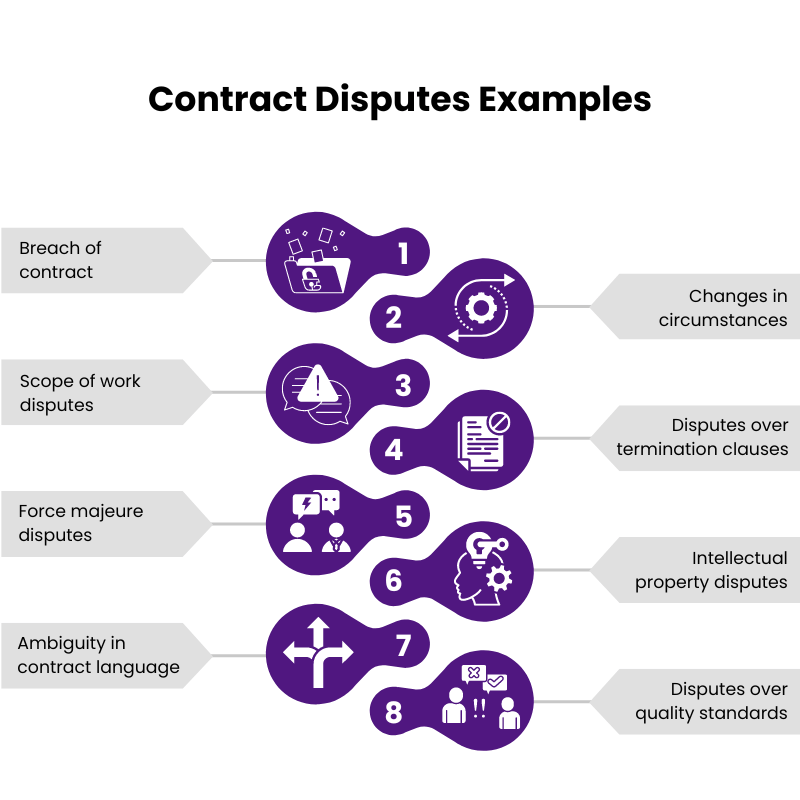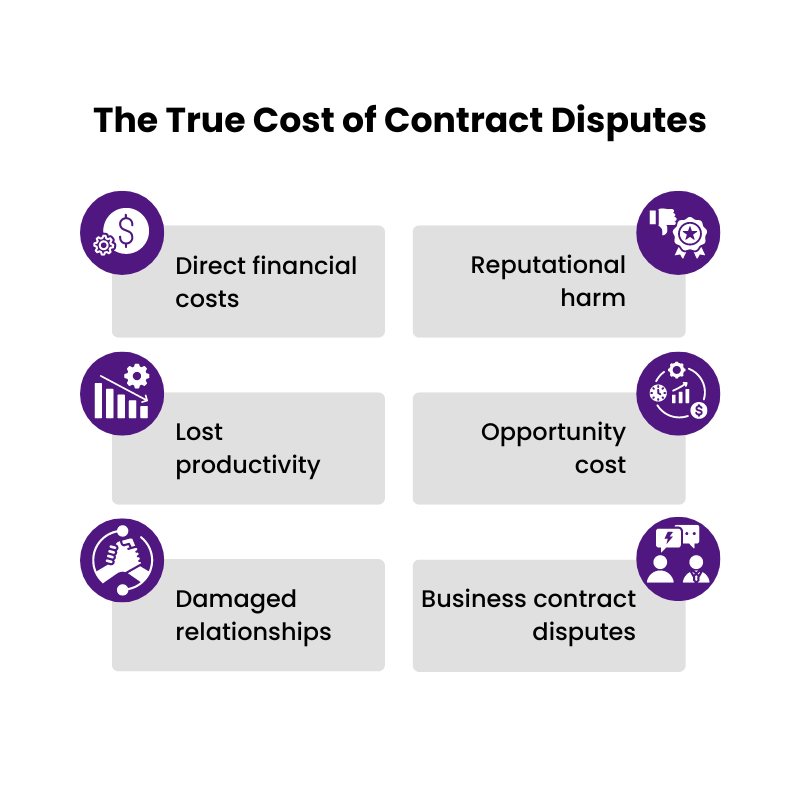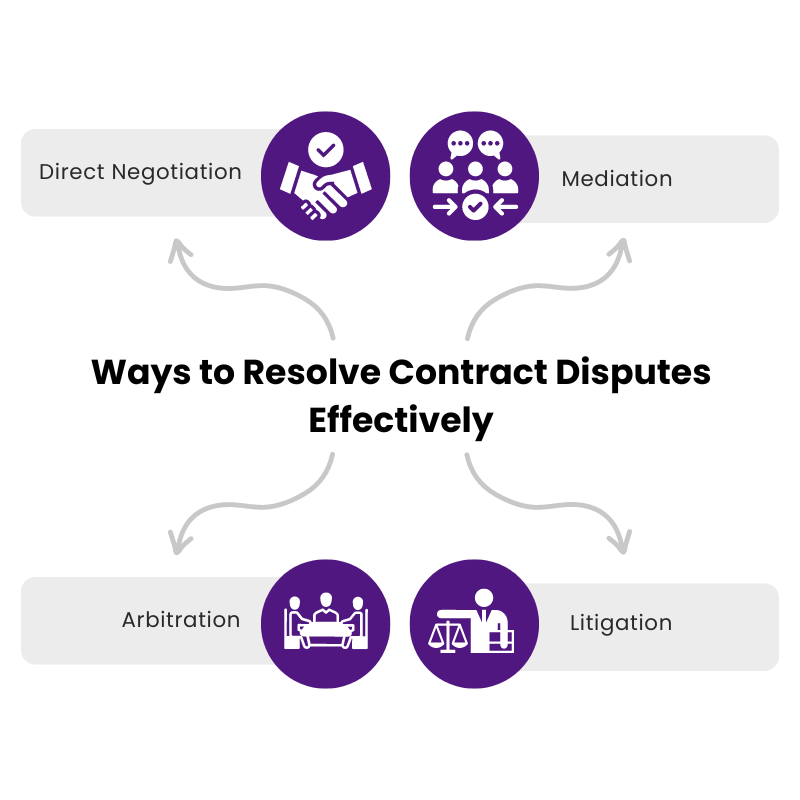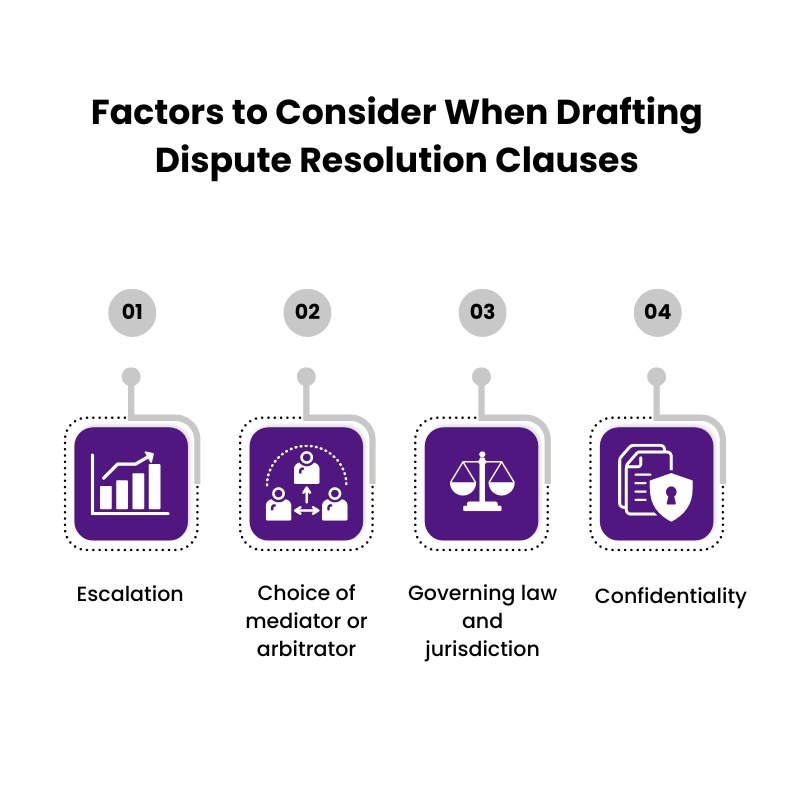Contracts are intended to provide clarity and security in business relationships.
Yet, misunderstandings, disagreements, and breaches of agreement are an unfortunate reality. These contractual disputes can disrupt projects, strain relationships, and lead to financial losses.
In this blog post, we’ll delve deeper into contract disputes, offering insights and strategies to help you safeguard your business interests. We’ll explore:
- What is a contract dispute?
- Comprehensive contract disputes examples
- The true cost of contract disputes
- Step-by-step guide to effective contract dispute resolution
- The power of dispute resolution clauses
Understanding Contract Disputes
What is a contract dispute?
A contract dispute emerges when parties bound by a contract disagree about the interpretation of its terms, one party’s adherence to the outlined obligations, or the appropriate remedies for a contract breach.
Comprehensive Contract Disputes Examples

Let’s illustrate some common and more complex contract dispute scenarios:
- Breach of contract: One party fails to uphold their end of the bargain, such as delayed payments, non-delivery of promised goods or services, or providing work that doesn’t meet agreed-upon standards.
- Scope of work disputes: Disagreements arise over what was explicitly included or excluded from the work outlined in the contract.
- Ambiguity in contract language: Vague language or contract clauses open to multiple interpretations create fertile ground for misunderstandings.
- Changes in circumstances: Unforeseen events beyond either party’s control might severely hinder or completely prevent the fulfillment of the contract’s terms.
- Disputes over termination clauses: Parties may disagree on the interpretation of contract termination clauses or the circumstances that warrant termination.
- Intellectual property disputes: Conflicts may arise over the ownership or use of intellectual property like patents, trademarks, or copyrights within the scope of the contract.
- Disputes over quality standards: The parties have differing views on whether the deliverables (goods or services) meet the quality standards established in the contract.
- Force majeure disputes: Parties might disagree on whether an unforeseen event (e.g., natural disaster, pandemic) qualifies as force majeure and warrants changes or termination of the contract.
The True Cost of Contract Disputes

Contract disputes carry a heavy price tag, both financially and otherwise. Here’s the breakdown:
- Direct financial costs: Legal fees, expert witness costs, arbitration or court expenses can quickly add up.
- Lost productivity: Time spent resolving disputes diverts attention away from core business operations, causing delays and lost revenue opportunities.
- Damaged relationships: Disputes can erode trust and strain business partnerships, making future collaborations difficult.
- Reputational harm: Protracted disputes that become public may damage a company’s reputation in the marketplace.
- Opportunity cost: The energy and resources invested in a dispute could be better spent on growth and innovation.
- Business contract disputes: The uncertainty and disruption caused by disputes can negatively impact overall business stability and decision-making.
How to Resolve Contract Disputes Effectively

Sometimes, even with the best preventative measures, disputes are unavoidable. Here’s a breakdown of the primary resolution tactics:
- Direct Negotiation: This should almost always be the starting point. Direct, good-faith negotiation allows for a swift and cost-effective solution that both parties can agree on.
- Mediation: When negotiations stall, mediation can help bridge the gap. A neutral mediator guides discussions and helps parties explore mutually agreeable solutions. Mediation is often faster and less expensive than arbitration or litigation.
- Arbitration: A more formal process than mediation, arbitration puts the decision in the hands of an arbitrator or panel. It’s binding, meaning the arbitrator’s decision is typically final. Arbitration can offer a faster and less costly resolution compared to litigation.
- Litigation: If other methods fail, litigation may be necessary, where the court resolves the dispute. This is often the most expensive, time-consuming, and adversarial option.
The Power of Dispute Resolution Clauses

Well-crafted dispute resolution clauses are essential for streamlining the process if a contract dispute arises. These clauses specify the preferred methods for resolving conflicts, saving both parties time, money, and stress.
Consider the following when including dispute resolution clauses in your contracts:
- Escalation: Outline a tiered approach, typically starting with negotiation, followed by mediation, and then arbitration if necessary.
- Choice of mediator or arbitrator: Determine whether to identify specific individuals or organizations in advance.
- Governing law and jurisdiction: Specify which state or country’s laws will apply to the contract and where disputes will be resolved.
- Confidentiality: Decide if the dispute resolution process should be confidential.
Contract disputes are a reality of business, but proactive measures and strategic resolution tactics can help. Prioritize prevention, but when disputes do arise, explore resolution methods that align with your business goals.
Remember, communication, documentation, and legal counsel are invaluable when navigating contractual disputes, especially in the realm of commercial contract disputes.




